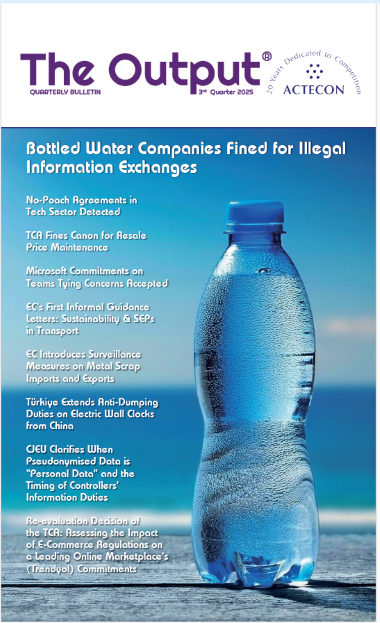Silence does not Mean Consenting to a Concerted Practice: TCA's V-Turizm Decision Reversed on Meritorious Grounds
| Competition Law

Silence does not Mean Consenting to a Concerted Practice: TCA's V-Turizm Decision Reversed on Meritorious Grounds
Article by Barış Yüksel and Cansı Çatak
Taking Turkey's 20-year history of the competition law practice into account, 2018 made history with the developments in administrative judicial review of the Turkish Competition Authority's ("TCA") decisions. Since 1998, no decision by the TCA whereby administrative fines were imposed based on Articles 4 (prohibiting anti-competitive agreements) and 6 (prohibiting abuse of dominance) of the Competition Law had been reversed by the Administrative Courts on meritorious grounds. This changed in the first six months of 2018. The first such decision was the Goltas Cement decision of the Ankara 10th Administrative Court, which we explained in detail in a separate article1. This was followed by the V Turizm decision of the Ankara 11th Administrative Court. Relevant decision of the TCA and that of the Administrative Court is analyzed below.
The TCA investigated whether V Turizm, which is a tour operator, agreed with three of its competitors (namely Alkan Grup Turizm, Antalya Pegas Otelcilik Turizm and Odeon Turizm) for jointly forcing hotels in Antalya not to accept tourists that are brought by Iati Turizm from Russia. In light of its findings, TCA decided that all four companies violated Article 4 of the Competition Law. It is important to note that the TCA took into consideration the fact that V Turizm was always in the receiving position of the e-mail communications that was used to prove the existence of the violation but held that this merely constituted a mitigating factor and did not absolve V Turizm of all responsibility.
The TCA emphasized that concerted practices do not have a formal format. Per the TCA, the undertakings that do not explicitly reject such e-mails may not claim that they are not a party to an agreement. In other words, the TCA is of the opinion that "silence means consent" when anti-competitive communications are considered.
Following this decision, V Turizm filed a lawsuit in the Administrative Court for the cancelation of administrative fines based on the following arguments:
- there were no e-mails sent to any hotels, stores, or social activity sites from V Turizm,
- there were no statements in the interview of the TCA with relevant players to indicate that V Turizm applied any pressure,
- having been in the "cc" section on e-mails does not mean V Turizm has had any will in this direction, and
- V Turizm and other companies within the scope of the investigation do not have sufficient power to discriminate against competitors.
In this process, the Administrative Court has examined all the evidence on the basis of the file and found that there is insufficient evidence regarding V Turizm is in agreement with the other companies' subject to this investigation to prevent their competitors' activities in the market. The Administrative Court stated that most of the evidence within the scope of the investigation are unilateral declarations sent via e-mail by companies other than V Turizm, and V Turizm is not in direct contact with its competitors. In addition, it is stated that there is no other concrete evidence against V Turizm such as an e-mail sent to hotels by V Turizm requesting them not to accept customers coming from Russia via Iati Turizm.
In addition, the Administrative Court emphasized that the complainant has increased its market share and income every year since 2013 and held that this contradicted with the claim that it was being excluded from the market via an anti-competitive agreement between its competitors.
After all these evaluations, TCA's decision was reversed on the grounds that there was not sufficient evidence to show that V Turizm restricted competition by entering into an agreement with the other three companies under investigation. The decision of the Administrative Court will serve as a guidance for future competition law enforcement, especially in relation to proof standards.
Footnotes







